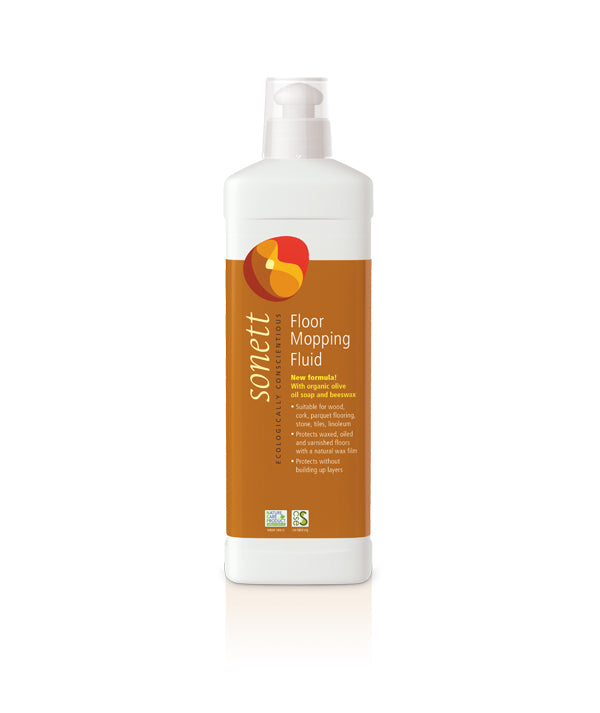
- Made in Germany
A mopping fluid based on organic olive-oil soap, organic carnauba wax and beeswax - free from petrochemical solvents, brighteners, emulsifiers and preservatives. Free from silicone oils. Completely biodegradable.
- Suitable for wood, cork, parquet flooring, stone, tiles, linoleum
- Protects waxed, oiled and varnished floors
with a natural wax film - Protects without building up layers
Product declaration
- Soap from olive oil, certified organically grown >30%
- Beeswax 5–15%
- Vegetable alcohol (ethanol) 5–15%
- Sugar surfactants 5–15%
- Carnauba wax, certified organically grown 1–5%
- Essential cajuput oil, certified organically grown <1%
- Balsamic additives, certified organically grown /
collection from wild-growing plants <1% - Water up to 100%
500 ml botle.
List of ingredients as per EC 648/2004
Aqua, potassium soap*, cera alba, alcohol denat., alkylpolyglucoside C8-C16 (coco glucoside), copernicia cerifera*,parfum*, linalool*, limonene*
*certified organically grown
Origin and properties of the ingredients
Beeswax and carnauba wax are used for, with a thin wax layer, gently protecting all surfaces made from wood, cork, linoleum, stone, etc. The organic carnauba wax is obtained from the leaves of the South American carnauba palm. Beeswax is a side product of apiculture whilst honey is being extracted from honeycombs by centrifuging.
The basis of this floor mopping fluid is organic olive-oil soap. Pure certified organically grown olive oil, by means of potassium hydroxide solution, is made into soap using a simple process without being exposed to external energy supply. Thanks to its slightly lipid-replenishing characteristics, the olive oil supports both wax components in their nourishing properties, furthermore having outstanding cleansing properties.
Ethanol, obtained by fermenting farinaceous plants or sugar-containing by-products such as molasses, helps maintaining the soap fluid, thus enabling a highly concentrated liquid product. Apart from its pleasantly refreshing fragrance, essential cajuput oil has a germ-inhibiting effect.
Dosage
Porous, oiled, unsealed wooden and stone floors: 10 ml (0,4 fl oz) per 5 litres (1.5 gal) of water.
Varnished and sealed surfaces of wood, cork, linoleum and tiles: 5 ml (0.2 fl oz) per 5 litres (1.5 gal) of water.
Attention
- Not to be used undiluted.
- Shake well before use. It may darken untreated wood, please test on a suitable spot before use.
- Floors primed with hard oil or wax, have to be professionally re-oiled or waxed in regular intervals.
Technical data
Density: 20 °C approx.0.99 g / cm³ (68 °F approx. 0.035 oz/ in³)
pH value: 20 °C, 20 ml/ 10 l H₂O (68 °F, 0.68 fl oz/ 2.6 gal US H₂O) approx. 7–8
Store in a frost-free environment.
Biodegradability
Carnauba wax and beeswax are natural waxes which are biodegradable. Soap made from organic olive oil, like all vegetable soaps, has one outstanding feature compared to all the other active washing substances, namely that, right after its use, it reacts chemically with the limescale always present in waste water, resulting in calcium soap, thus neutralising its surfactant effect on aquatic organisms (primary degradation). The calcium soap is then, by microorganisms, 100 % degraded into carbon dioxide and water (secondary degradation). Despite the fact that during the manufacturing of sugar surfactants, constituents are being extracted from the plant-based raw materials, i.e. starch, sugar, and fat, they remain completely intact in their natural molecular structure. For this reason it is relatively easy for the microorganisms to 100 % decompose these surfactants. Soap and sugar surfactants are classified as being readily biodegradable according to OECD guidelines.
Suitable for septic tanks and filtration systems.
Certification
CSE (Certified Sustainable Economics)
Packaging
Bottle, canister: PE
Cap: PE / PP
Label: PE
Dosing cap: PP

